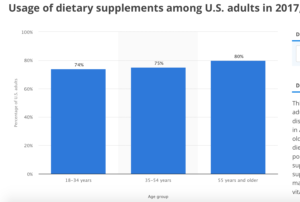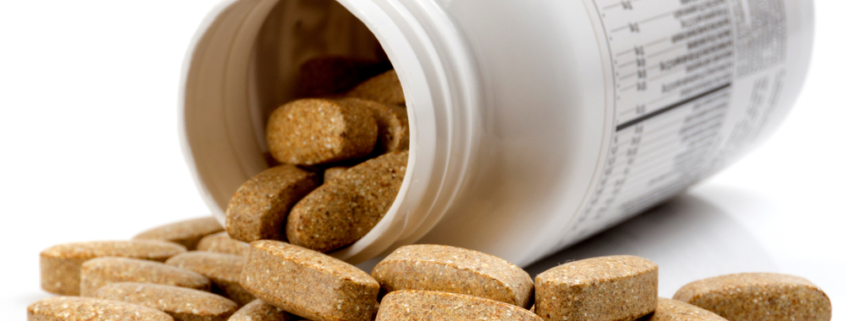Nutritional supplements and strength training: Part 5 – Questions you should consider asking before ingesting
If you have read and been influenced by the prior four installments in this article series on nutritional supplementation. I trust you moved past the place where your primary influences on selecting your supplements included what ‘everyone’ is taking, the claimed benefits in the marketing material, and the claimed ingredients on the label.
If so you may find real value in this, Part 5, of the series. In this article I focus on what I believe are some of the key questions to ask and answer prior to selecting a supplement.
Note many of the questions revolve around the concept of trust. Not blind, head in the sand type of trust, that may have been the platform for some of your selection decisions in nutritional supplementation to date. Rather the kind of trust that is earned slowly and lost fast.
How many people in the US alone take nutritional supplements? About 75% of the population! There are a lot of people who need to be asking questions before they consume their nutritional supplements!

Here are seventeen (17) questions you should consider asking before settling on a supplement.
- Who owns the company?
- Who founded the company?
- What was the reason the company was founded originally?
- Are nutritional supplements their core business?
- How long have they been operating?
- How many product recalls and FDA complaints have they been subject to?
- Does the company care about your health as much if not more than their profits?
- Who formulated the product/s?
- Are their scientists in-house or outsourced?
- Do they manufacture in-house or outsource?
- Do they manufacturer at GMP?
- Do they guarantee the potency of every pill?
- What is their refund policy?
- What customer support do they offer?
- Is the product approved for use in your country?
- Will the products dissolve in a timely and optimal way?
- Will I pass a drug test?
Q1. Who owns the company?
The first question is about ownership. Put aside the company name. Ask who owns it? Company acquisitions are part of business life, and often the original name is retained to exploit the marketing power of the original owner. Don’t accept or assume that the name on the company still owns the company. Dig a bit deeper.
When you are confident you have found the owner of the company – be it an individual or an entity – do your homework on the owner. What you are wanting to understand are the values of the people who run the company. Do they really care about you?
Q2. Who founded the company?
If it turns out the current owners (individuals or entity) were not the ones who founded the company in the first place, find out who was the founder of the company.
Q3. What was the reason the company was founded originally?
The purpose behind the company’s origin provides a great insight into the values and operations of the company. Was the company found with the primary purpose to make a profit, or were there more altruistic motives, such as contributing to the quality of life of society.
The original purpose for the existence of the company in the first instance tells you a lot about the company. Sure, things can change, but this information is I suggest incredibly valuable and insightful.
Q5. How long have they been operating?
Relatively few companies make it past the ten year mark, and even less the twenty year mark – and so on. Now being a younger company doesn’t make it bad, it just means it hasn’t proven itself. Generally speaking a company that has compliance, integrity, or profit before purpose issues usually gets found out over time. On the other hand, those companies who are truly adding value to customers in a sustainable business culture typically last longer.
Q6. How many product recalls and FDA complaints have they been subject to?
In the internet era it’s not too difficult to discover the ‘skeletons in the closet’ of a company. Now you can give a company a ‘leave pass’ on one or two ‘hiccups’, however if you start seeing a pattern you may want to pass on this company’s offerings.
Q7. Does the company care about your health as much if not more than their profits?
Profit before purpose is important. I have no issues with companies making a profit – in fact it’s healthy for their sustainability. However it can be done without putting the needs and safety of the consumer at risk.
Your challenge is to get a feeling for a company’s values, and find a company that aligns with your own values of the profit and purpose trade-off.
Q8. Who formulated the product/s?
Now I don’t mind any one putting their hand up as to formulate a product, however with consumer safety and efficacy in mind, I would prefer there is evidence of that person/s background in the science of formulation.
Q9. Are their scientists in-house or outsourced?
Are the ‘scientist/s’ behind the formulation a full-time employee of the company or a sub-contractor? I have my concerns with consumers who rely on sub-contracting relationships with their scientist.
This ‘guns for hire’ approach does not give me confidence about the longevity of the company, as they may lack the uniqueness in the market pace on the basis of who else may gain access to their formula’s.
Q10. Do they manufacture in-house or outsource?
Manufacturing in-house gives me confidence about the control of the manufacturing process. It also gives the company greater commercial sustainability as they are less likely to be sharing their formulas (directly or indirectly) with other companies.
Manufacturing out-sourced can and does work, however it demonstrates a company that lacks the financial means to develop their own manufacturing plant.
Q11. Do they manufacturer at GMP?
Look for GMP reference in the company’s web site about their manufacturing. GMP stands for ‘Good Manufacturing Practices’, a term aimed to designate that drugs or nutritional supplements are being manufactured at pre-determined high standards. This is not optional for drugs, but it is for nutritional manufacturing.
Now a lot of people may throw around claims about their GMP processes. If you want to be sure, I suggest you take a walk through the manufacturing plant.
A hint here – if you find this difficult to achieve, and when you do are dressed in head, clothing and feet covers like you are entering a nuclear plant – you can have more confidence they do use GMP! If not, you should be very skeptical!
Regarding claims of FDA Approved supplement (food) manufacturing facilities, the FDA denies that exists, stressing the difference between FDA ‘registered’ and FDA ‘approved’:[1]
FDA does not “approve” health care facilities, laboratories, or manufacturers. FDA does have authority to inspect regulated facilities to verify that they comply with applicable good manufacturing practice regulations. Owners and operators of domestic or foreign food, drug, and most device facilities must register their facilities with FDA, unless an exemption applies.
Q12. Do they guarantee the potency of every pill?
Will the company guarantee that each and every pill will be exactly what the label says – in both what types of material it contains, as well as the dosages of each of the materials will be as per the label.
This is more important than you may realize, and offered by less companies than you may expect.
Q13. What is their refund policy?
Does the company have a rock solid clearly stated refund policy? Is it at least at 30 days no questions asked one? What is their history of keeping their word?
A company with a great track record in the refund department should give you a lot of confidence. So go behind their claims – find out if they do what they say they do.
Q14. What customer support do they offer?
Once you have bought the product, how much help can you get? Can you call their customer support center on a toll-free number at least during business hours and get support? Do they offer online resources such as a Q&A database for a customer with a more inquiring mind to find out more about the products? For example, does product x have gluten? Does it contain anything else commonly considered an allergen? Do they offer free customer web portals that allow the customer education and online order managing?
Q15. Is the product approved for use in your country?
In a global economy it is quite normal that products travel from the country of manufacturer to a different country for consumption. The question is whether the product is approved by the regulators of your country for sale. The fact that it got in through customs is not evidence of this.
Consuming a product that is not approved for use in your country will most likely deny you of any usual consumer recourse in the event of an adverse product reaction. Even worse, selling that product to a client in a country where the product is not approved for sale may deny the seller any product indemnity insurance, exposing them to litigation (a risk I see taken by physical coaches all too often).
Also be mindful that even if the product is manufactured in your country is no guarantee that it is approved for sale in your country!
Q16. Will the products dissolve in a timely and optimal way?
There is still a major question – will the product dissolve in the body in the time frame it has before elimination. Don’t take this for granted.
The following is provided by ConsumerLab.com:[2]
The standard laboratory test for disintegration (part of the test known as the United States Pharmacopeia [USP] “Disintegration and Dissolution of Dietary Supplements” method <2040>), is an important test of product quality, although passing this test alone does not assure bioavailability – which depends on additional factors such as how well ingredients are absorbed. During the test, the product under investigation is continuously agitated in warm water for 30 minutes. In that time, the pill should have dissolved or fallen apart to the extent that, if touched, there is no hard core remaining.
They also go on to say: [3]
Poor disintegration is most common with vitamin and mineral supplements. However, other products, including herbals, sold in tightly packed or heavily coated tablets or caplets, may also have poor disintegration, remaining intact after the 30-minute test. Most capsules, by contrast, fall apart easily, and most chewable products (as long as they’re chewed) disintegrate. Poor disintegration can result from poor manufacturing practices and quality control.
Upgrading formulas includes research and development costs. Does the company have the financial means to do this? How often? Hopefully every 5-10 years. Now I am not talking about changes to the artwork of the label – I am talking about real upgrades, improvements, to the formula.
Q17. Will I pass a drug test?
Now I understand that question is not relevant to everyone but it is to say Olympians, and any others who participate in sports that have ‘real’ drug tests.
The World Anti Doping Agency (WADA) is responsible for controlling drug testing globally. It’s important to note the following:[4]
WADA is not involved in any certification process regarding supplements and therefore does not certify or endorse manufacturers or their products. WADA does not control the quality or the claims of the supplements industry which may, from time to time, claim that their products have been approved or certified by WADA.
If a company wishes to promote its products to the sport community, it is their responsibility as a manufacturer to ensure that the products do not lead to any anti-doping rule violation. Some third-party testers of supplements exist, and this may reduce the risk of contamination but not eliminate it.
So don’t get misled by the supplement companies claims. At best they have used a third party certification, which is better than nothing, but this approval is not given by WADA itself. An example of a third party certification organization for WADA compliance is Informed Choice.org.
Summary
So there you have it – seventeen questions you should consider asking and answering before putting a nutritional supplement in your mouth. If you think that is too many questions, rest assured, there are many more that you can and probably should ask!
In conclusion you might also reflect on a comparison of the questions I have raised versus the methods of discernment typically offered up on other articles. I suggest many of the are off-track or lacking.
[1] https://www.fda.gov/ForConsumers/ConsumerUpdates/ucm047470.htm
[2] https://www.consumerlab.com/results/hometest.asp
[3] https://www.consumerlab.com/results/hometest.asp
[4] https://www.wada-ama.org/en/questions-answers/prohibited-list-qa#item-1359



